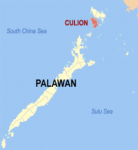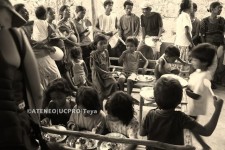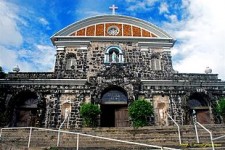Introduction
The Literacy Program in Culion, Palawan aims to develop the reading and writing skills of both the adults and children in selected Tagbanua communities. The program also aims to preserve the Tagbanua’s local culture and develop stronger and more confident communities.
Jesuit presence in Culion
In 1904, Gov. Wright of the American Commonwealth, established Culion as a leper colony paving the way for the first batch of 370 lepers from all over the archipelago to settle in 1906. In the same year, American Jesuits were sent to Culion to start chaplaincy work for the lepers and employees of the Philippine Health Service. Over the years, the Loyola College of Culion was established and has seen the chaplaincy to La Inmaculada Concepcion Parish grow and flourish.
 Fr. Bok Arandia SJ, during his stay in Culion wrote, “after the establishment of the leper colony, the indigenous Tagbanua communities who were the original inhabitants of the Culion peninsula were forced to settle in remote islands, with limited access to basic social services and education. They manage to survive through fishing, food gathering, and primitive agriculture. However, because of their inability to read, write and count, certain devious individuals have taken advantage of their ignorance, cheating them to sell their produce and catch at scandalously low prices. Politicians have likewise used them to secure victory during elections, gathering and containing them in undisclosed holding areas distant from the influence and access of their political rivals.”
Fr. Bok Arandia SJ, during his stay in Culion wrote, “after the establishment of the leper colony, the indigenous Tagbanua communities who were the original inhabitants of the Culion peninsula were forced to settle in remote islands, with limited access to basic social services and education. They manage to survive through fishing, food gathering, and primitive agriculture. However, because of their inability to read, write and count, certain devious individuals have taken advantage of their ignorance, cheating them to sell their produce and catch at scandalously low prices. Politicians have likewise used them to secure victory during elections, gathering and containing them in undisclosed holding areas distant from the influence and access of their political rivals.”
In 2006, the Philippine province re-examined its mission in Culion. Since there was no need for chaplaincy work due to the fewer number of lepers in the island, the Province decided to help the Tagbanuas, an Indigenous People community, through a literacy program.
In 2008, through the help of the Sisters of St. Paul of Chartres, a literacy program was began with some teachers from the parish. In 2011, Cartwheel Foundation brought their expertise and modules to help aid and systematize the program. Since then, the parish, SPC and Cartwheel have been partners in this endeavor.
The program
Before 2011, literacy programs that were introduced had no sustainability mechanisms in place. Hence, there was a crucial and urgent need to establish one that will remain a fixture in order to equip members of the communities with essential literacy and life skills.
The first six-month cycle of the new program began at the end of August, 2011 with forty (40) adult learners from two (2)Tagbanua communities – Alulad and Marabal.
In June 2013, the adult capability-building program ran its third cycle, further expanding operations to four (4) indigenous communities from the original two (2) pilot areas. They have also instituted an early childhood education program for the Tagbanua communities in Culion.
Currently, the Adult Literacy Program is run by the Cartwheel Foundation, Our Lady of the Immaculate Concepcion Parish and the St. Paul of Chartres Sisters. Fr. Arthur Nebrao, SJ is currently Parish priest of La Inmaculada Concepcion.
Culion after Typhoon Yolanda
Typhoon Yolanda hit Culion with devastating effects. These photos were taken during the visit of the Ateneo Disaster Response and Management (DReaM) Team and the Simbahang Lingkod ng Bayan in Culion, Palawan last December 5 to 9. The team visited the different areas and islands devastated by Typhoon Yolanda.
Why help?
Indigenous Peoples, like the Tagbanuas are generally discriminated not only because of their physical appearance but because many of them have low self esteem due to the lack of reading and writing skills.
Please donate to support the Literacy program and help build their lives in the aftermath of typhoon Yolanda! The Literacy program’s next steps are:
- Collaborate with the Loyola College of Culion to house an IP school that would receive students who are ready for formal education through the Literacy Program.
- Bring the Literacy Program to other far-flung communities.
- Conduct Train the Trainors workshops among previous beneficiaries to ensure continuous execution of the literacy program.
Click the Blue box above to make an on-line donation. Or else, click here.



